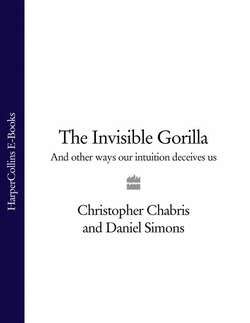Читать книгу The Invisible Gorilla: And Other Ways Our Intuition Deceives Us - Christopher Chabris - Страница 24
Forgetting a Life-and-Death Matter
ОглавлениеMemory distortions are not limited to irrelevant details like whether or not books were in an office or particular words were part of a list. In fact, they can apply to life-and-death decisions, even those that you yourself have made. Australian psychologist Stefanie Sharman and her colleagues conducted an experiment that calls to mind the classic Seinfeld episode in which Kramer asks Elaine to help him and his lawyer work through a long list to decide the medical circumstances under which he would be willing to carry on living. (Lawyer: “OK. One lung, blind and you’re eating through a tube.” Kramer: “Naw, that’s not my style.” Elaine: “Borrrr-ing.”) The researchers interviewed adults and asked them to make (more realistic) decisions about which life-sustaining treatments they’d want if they were seriously ill.32 For example, would they want only CPR performed, or would they also want to be fed artificially if necessary? They interviewed the same people twelve months later using the same questions.
Overall, 23 percent of all their decisions changed between the initial interview and the follow-up, meaning that people who said during the first interview that they would want a life-extending treatment said during the second interview that they wouldn’t want it (or vice versa). That people would change their preferences is not terribly surprising. Perhaps they had discussed the possibilities with friends, relatives, or doctors in the interim; maybe they encountered news stories about end-of-life issues. What is striking is that 75 percent of the people who changed their minds were unaware that they had done so! They thought that the decision they reported in the second interview was the same as their decision in the first interview. Their memory for what they had said earlier was rewritten to match their current beliefs.
The illusion of memory leads us to assume—unless we receive direct evidence to the contrary—that our memories, beliefs, and actions are mutually consistent and stable over time. Amid the national grief after President Kennedy was assassinated, a poll showed that two-thirds of people claimed they had voted for him in the 50/50 squeaker election of 1960.33 At least some of them must have revised their memories of how they voted three years earlier, probably to make them consistent with the positive feelings they had about their fallen leader. More broadly, we tend to assume that everything in our world is stable and unchanging unless something draws our attention to a discrepancy. When our beliefs change, though, our memories can change along with them. A living will you produced a few years ago may not reflect your current preferences—but you are likely to misremember its contents and assume that it expresses what you want today. If you become seriously ill and are unable to communicate, doctors will rely on this document and may inadvertently take actions that contradict your wishes.
